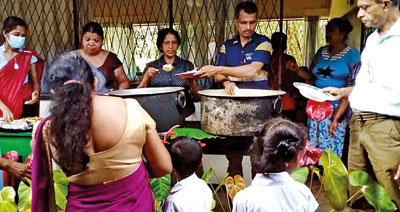News
More Lankan children going to school on empty stomachs
View(s):
Parents and teachers at the Alapalawala Maha vidyalaya collected money and cooked meals to serve hungry children. Pix Raweendra Welagedara
By Senuka Jayakody
Principals, teachers, and education officials have been finding ways to help children cope.
Wimal Piyatissa, the executive secretary of the Joint Teacher’s Service Union, said malnutrition that has existed in the country for long has worsened because of the economic collapse. While the Government had earlier introduced a plan to provide 1.1 million students with meals, for two years has not happened.
Allocating Rs. 30 to provide a meal for a student is useless at a time when food inflation is 90%, while parents’ incomes have reduced, or they have lost their incomes, he said.
Mr Piyatissa said the situation in Colombo is far worse than in the villages, as students in the villages can find food and water from their surroundings.
“We need a system that considers both rural and urban areas,’’ he said.
Kotahena Central College Principal Mohan Parakrama Weerasinghe, who is also general secretary of the National Principals Association, said his school has children from lower-income families who are in a desperate situation.
The school is now distributing gruel (kenda) to students with the support of teachers. A separate day is allotted for each grade. This started in the last week of the previous term. Many of the parents of the students are daily wage-earners and the students help their parents as well.
Parents have even stopped children’s tuition classes, he added, blaming the politicians for causing this misery.
Without adequate nutrition, children are unable to absorb lessons in school.
Mr. Weerasinghe said that a child whom he had seen presenting with pale eyes, has four siblings, the father is a mason and mother works in a kottu eatery. The child had worshiped his teacher after getting a meal of rice.
Only around 60% of students come to school now, and the duration of the morning assembly has been reduced, he said.
On one occasion, counsellors helped to prevent the potential suicide of a child who was extremely depressed, he said.
The principal of Kadawatha Mahabodhi College and the chairman of the Principals Service Union, D. M. S. Premathilake has discussed with business people in Colombo ways to provide gruel for needy children.
Even though the Government increased the Rs. 30 provided to school to Rs. 60 in August, it is yet to be given and is not enough.
Children who had come with their parents who are doing odd jobs in Colombo, have already gone back to their villages, Mr. Premathilake said, while more children are fainting at the morning assembly because they have not had breakfast and had skipped dinner.
However, the principal of Siyuralumulla Primary school, Naveendra Liyanage, said it is good to see children return to school.
The school has stopped morning assembly. Students only eat rice and dhal for all three meals. If a student does not have a mid-day meal, a teacher will collect food from other students and give to those who need a meal.
He agrees that unlike in urban schools, his school, situated in the province, is not desperate, as village children have jackfruit to eat.
Unlike before, where only one or two children were reported to be low weight and has not gained height, this year, 25% were reported to be so.
The general secretary of the Ceylon Teacher Service Union, Mahinda Jayasinghe, said the issue is widespread.
He said some children bring only two string hoppers to school, or one spoonful of rice with sambol. The increase of the allocation for school meals to Rs. 60 from Rs 30 is insufficient, he said.
Mr. Jayasinghe demanded that the Government undertake a national survey to find ways to
end malnutrition.
The best way to say that you found the home of your dreams is by finding it on Hitad.lk. We have listings for apartments for sale or rent in Sri Lanka, no matter what locale you're looking for! Whether you live in Colombo, Galle, Kandy, Matara, Jaffna and more - we've got them all!

